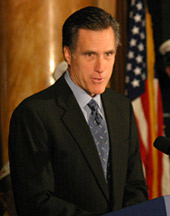By DANIEL LATHROP
P-I REPORTER
Washington might be a blue state, but it was one of the reddest candidates who led the pack in fundraising here during the first three months of the year.
Republican Mitt Romney, the former governor of Massachusetts, raised more than $273,000 in Washington, according to campaign finance reports turned in Sunday.
"Voters in Washington agree we need to bring real change to our nation's capital. ... These supporters will be vital to our success on the way to winning the nomination, " said Romney spokeswoman Sarah Pompei.
Romney had a liberal to moderate image and record in Massachusetts but is trying to repackage himself as a Christian conservative in his bid for the presidency.
Close behind Romney in the state are two Democrats: former Sen. John Edwards of North Carolina with $250,175 and Sen. Barack Obama of Illinois with $223,544, according to the Federal Election Commission.
Nationwide, Romney was the top Republican fundraiser, with $20.7 million so far. The top Democrat is Sen. Hillary Clinton of New York, with $26 million raised and $10 million more transferred from her successful re-election campaign. Obama raised close to $26 million nationally. Edwards raised almost $15 million, an amount that would have made him the top Democratic fundraiser at this point in most past elections.
Despite a wealth of fundraising unprecedented this early in an election campaign, Washington's donors, who have been generous in the past, have not yet shown their colors.
People here have given only about three-quarters of 1 percent of the national total, according to public filings detailing donors of more than $200.
Wealthy donors are the key constituency in the "money primary"-- the fundraising race that shapes the outcome of presidential nominations before a single caucus is held or a single vote is cast.
While a Republican was the top recipient, the state's Democrats outdid the GOP, accounting for about $600,000 of the $1 million raised here.
Big money came from the technology companies -- at least $65,000 -- and area law firms -- about $135,000.
Trial lawyers, some of the Democrats' richest partisans, strongly backed Edwards in 2004 but are more divided this time around. Even so, in Washington Edwards raised at least $75,000 from law firms.
Obama, meanwhile, drew half the contributions made by tech workers, including donations from RealNetworks Inc. CEO Rob Glaser and Zillow.com President Lloyd Frink.
While many in the Republican establishment -- led by former Sen. Slade Gorton -- are backing Arizona Sen. John McCain, his total fundraising was about $72,000. Those supporters include some heavyweights, such as Gorton and former U.S. Attorney Mike McKay.
Still, many of the area's most prominent political names are missing.
Some, such as Democratic megadonor and environmental leader Maryanne Tagney-Jones, have made up their minds but are waiting for a strategic moment to write that big $2,000 or $4,000 check.
Tagney-Jones is involved in planning for a major fundraising event to benefit Clinton, who has so far collected less than $100,000 in the state. In the past, Clinton has been a tireless fundraiser in Washington, so many of her supporters could be biding their time.
"I was waiting to (donate) when we did this fundraiser," said Tagney-Jones, whose husband, Bruce Jones, is a major donor to Democrats. "We will obviously be maxing out to the campaign."
One of those who did give to Clinton was Microsoft co-founder Paul Allen, who contributed $4,600, the legal maximum for the 2008 elections.
Ken Alhadeff, real estate mogul and major donor to Democrats, says he hasn't made up his mind whom he will support but is optimistic about all the candidates. "I think what the last couple years have shown us is that given the right circumstances, anyone can win."
Patricia Herbold, U.S. ambassador to Singapore and the former chairwoman of the King County Republican Party, hasn't yet contributed. Neither has her husband, Bob Herbold, Microsoft Corp.'s former chief operating officer.
Each person can give up to $2,300 to a candidate's bid for the nomination and another $2,300 that could be used if the candidate wins the nomination.
The leading candidates from both parties have announced that they will not be seeking federal matching funds during the primary and have begun raising money to replace public financing for the general election.
That allows the candidates to raise and spend much more and ignore other constraints that come with participating in the public financing system, a cornerstone of post-Watergate reforms to the nation's campaign finance laws.
HOW THEY RANK
Presidential candidates raising $10,000 or more in the state January-March 2007. The total includes money that can be spent for the primaries and the general election.
Former Gov. Mitt Romney, R-Mass.: $273,300 of $20.7 million total
Former Sen. John Edwards, D-N.C.: $250,175 of $14 million total
Sen. Barack Obama, D-Ill.: $223,544 of $25.7 million total
Sen. Hillary Clinton, D-N.Y.: $91,255 of $26 million total
Sen. John McCain, R-Ariz.: $72,266 of $13 million total
Gov. Bill Richardson, D-N.M.: $37,710 of $6.2 million total
Sen. Chris Dodd, D-Conn.: $34,900 of $4 million total
Former New York Mayor Rudy Giuliani, R-N.Y.: $30,000 of $14.7 million total
Sen. Joe Biden, D-Del.: $11,500 of $2.1 million total



